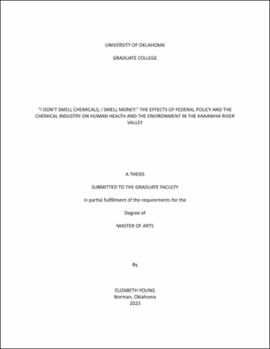| dc.contributor.advisor | Hines, Sarah | |
| dc.contributor.author | Young, Elizabeth | |
| dc.date.accessioned | 2023-12-12T13:45:35Z | |
| dc.date.available | 2023-12-12T13:45:35Z | |
| dc.date.issued | 2023-12-15 | |
| dc.identifier.uri | https://hdl.handle.net/11244/340039 | |
| dc.description.abstract | Federal policy and the need for American produced chemicals saw a need for a domestic chemical industry to be erected in the Kanawha Valley of West Virginia during World War I. Following the war, federal policy continued supporting the chemical industry and throughout the Interwar Period and World War II Union Carbide, DuPont, and Monsanto constructed chemical plants in the valley. The chemical industry continued growing in the valley despite the rise of the environmental movement following World War II, and during the second half the twentieth century residents of the Kanawha Valley formed conflicting opinions regarding the benefits of the industry in the area. Accordingly, this thesis studies the means by which federal policy supported the chemical industry and, in turn, the industry negatively impacted human health and the environment. | en_US |
| dc.language | en_US | en_US |
| dc.subject | West Virginia | en_US |
| dc.subject | Appalachia | en_US |
| dc.subject | Environmental History | en_US |
| dc.subject | History | en_US |
| dc.title | “I don’t smell chemicals, I smell money:” the effects of federal policy and the chemical industry on human health and the environment in the Kanawha River Valley | en_US |
| dc.contributor.committeeMember | Holland, Jennifer | |
| dc.contributor.committeeMember | Soppelsa, Peter | |
| dc.contributor.committeeMember | Grinberg, Ronnie | |
| dc.date.manuscript | 2023-12 | |
| dc.thesis.degree | Master of Arts | en_US |
| ou.group | Dodge Family College of Arts and Sciences::Department of History | en_US |
| shareok.orcid | 0009-0005-8391-8953 | en_US |
